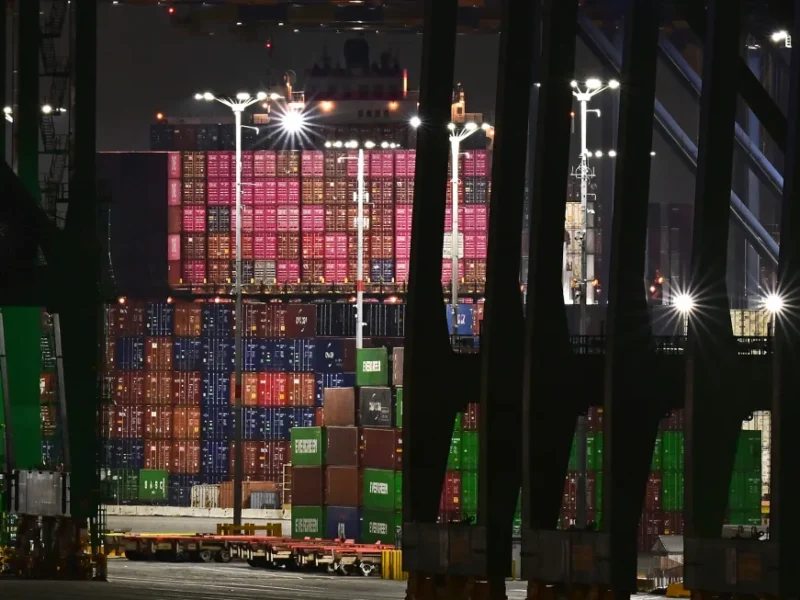In 2017, Christina and Ian Lacey took a leap of faith, leaving behind stable careers to turn their passion into a small business.
Their gamble paid off. Operating from their home in Denver, they launched Retuned Jewelry and grew it into a successful venture, averaging $360,000 in annual revenue, mainly through sales at music and art festivals.
Christina, a former dental assistant, and Ian, previously in IT, craft earrings, necklaces, and bracelets from donated guitar and bass strings.
“We’ve dedicated everything to this,” Christina shared with CNN. “We’ve pushed through exhaustion to keep it going.”
However, their future is now uncertain because of President Donald Trump’s proposed 145% tariffs on Chinese imports, which made up nearly $440 billion in goods entering the U.S. in 2024. While tariffs affect businesses across the board, small businesses like Retuned Jewelry are particularly vulnerable, said John Arensmeyer, CEO of Small Business Majority, an advocacy group supporting 85,000 small businesses.
Arensmeyer noted that small businesses, which operate with slimmer profit margins and less bargaining power with suppliers, may be forced to raise prices, cut jobs, stall expansion plans, or even close in response to higher import costs.
Although the Laceys use donated strings, they depend on other components — like beads, chains, clasps, and hooks — sourced from China. Ian explained that finding domestic alternatives hasn’t been successful.
“We’ve searched,” he said. “There’s no U.S. manufacturer producing what we need.” Facing these challenges, the Laceys have already increased their product prices in preparation for the tariffs.

Christina and Ian Lacey at the Cattle Country Music Festival in Gonzales, Texas, on April 11, 2025.
Arensmeyer explained that small businesses often lack the financial reserves needed to withstand sudden cost increases. He described the tariffs as a crisis for small businesses, emphasizing that they have very little control over the situation.
For the Mitchell Group — a second-generation, family-run textile company in Niles, Illinois — limited cash reserves could create major challenges during production disruptions.
“Tariffs have placed significant pressure on our cash flow,” said Ann Brunett, the company’s chief operating officer. “Our model involves holding inventory, so I’m paying a 45% tariff — plus standard duties — on products that might stay on the shelf until distributors require them. It ties up our capital.”
The Mitchell Group, led by president Bill Fisch, employs 18 full-time workers and 12 sales representatives, generating just under $10 million in annual revenue.
Brunett stressed that the company is committed to doing “everything possible” to stay afloat and avoid layoffs, noting that the business “means everything to us.”
Fisch has looked into shifting production to Vietnam, India, Malaysia, and even Europe but found no suitable replacement. “China’s infrastructure is unmatched,” he said. “We need our coated fabrics manufactured entirely under one roof, meeting our strict standards. Splitting production across multiple countries just doesn’t work.”
Tariffs are unlikely to bring textile manufacturing back to the U.S.
Although Trump has promoted tariffs as a strategy to boost domestic manufacturing, Arensmeyer cautioned that rebuilding U.S. production capacity would take significant time.
“You can’t solve this overnight,” Arensmeyer said. “You can’t simply impose a tariff and expect consumers to switch to American-made goods when those goods aren’t even produced here.”
According to Sheng Lu, a professor at the University of Delaware’s Department of Fashion and Apparel Studies, the U.S. textile and apparel sector has been in steady decline for decades, driven by globalization and cheaper production abroad.
Bill Fisch from the Mitchell Group pointed out that critical materials like specialized vinyl polymers and textiles are nearly impossible to source within the United States. China remains the leading global supplier, producing a wide range of materials from cotton and silk to synthetic fibers and vinyl.
Fisch also mentioned that staffing a textile factory in Mississippi would be extremely difficult due to labor shortages.
“For our type of textile products, the industry here is virtually gone,” he said.











